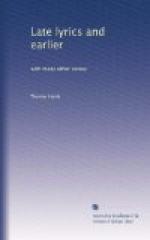There stood in the air up to the parapet
Crowning the corner height, the stones as set
By him—ashlar whereon the gales might drum
For centuries to come.
“I carried them up,” he said, “by
a ladder there;
The last was as big a load as I could bear;
But on I heaved; and something in my back
Moved, as ’twere with a crack.
“So I got crookt. I never lost that sprain;
And those who live there, walled from wind and rain
By freestone that I lifted, do not know
That my life’s ache came so.
“They don’t know me, or even know my name,
But good I think it, somehow, all the same
To have kept ’em safe from harm, and right and
tight,
Though it has broke me quite.
“Yes; that I fixed it firm up there I am proud,
Facing the hail and snow and sun and cloud,
And to stand storms for ages, beating round
When I lie underground.”
THE SAILOR’S MOTHER
“O whence do you come,
Figure in the night-fog that chills me numb?”
“I come to you across from my house up there,
And I don’t mind the brine-mist clinging to
me
That blows from the quay,
For I heard him in my chamber, and thought you unaware.”
“But what did you hear,
That brought you blindly knocking in this middle-watch
so drear?”
“My sailor son’s voice as ’twere
calling at your door,
And I don’t mind my bare feet clammy on the
stones,
And the blight to my bones,
For he only knows of this house I lived in before.”
“Nobody’s nigh,
Woman like a skeleton, with socket-sunk eye.”
“Ah—nobody’s nigh! And
my life is drearisome,
And this is the old home we loved in many a day
Before he went away;
And the salt fog mops me. And nobody’s
come!”
From “To Please his Wife.”
OUTSIDE THE CASEMENT (A REMINISCENCE OF THE WAR)
We sat in the room
And praised her whom
We saw in the portico-shade outside:
She could not hear
What was said of her,
But smiled, for its purport we did not hide.
Then in was brought
That message, fraught
With evil fortune for her out there,
Whom we loved that day
More than any could say,
And would fain have fenced from a waft of care.
And the question pressed
Like lead on each breast,
Should we cloak the tidings, or call her and tell?
It was too intense
A choice for our sense,
As we pondered and watched her we loved so well.
Yea, spirit failed us
At what assailed us;
How long, while seeing what soon must come,
Should we counterfeit
No knowledge of it,
And stay the stroke that would blanch and numb?
And thus, before
For evermore
Joy left her, we practised to beguile
Her innocence when
She now and again
Looked in, and smiled us another smile.




